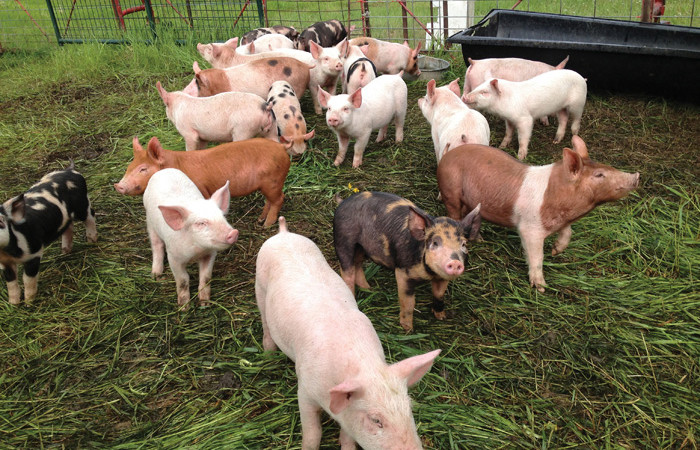

Pastured pigs are free range pigs that are born and raised outdoors and spend their entire lives free to graze on pasture in open paddocks.
Pastured pork is not ‘grass fed’ pork, not in the truest sense of that term because pigs cannot survive on grass alone. Pigs are omnivores and that means that like you and me, they need a varied diet that consists of a nutritionally balanced feed that includes fibre, energy (carbs) and protein along with essential vitamins and minerals.
Pigs on pasture do eat a lot of grass and also get a lot of their nutritional needs from the soil but the main reason for calling them pastured pigs is to best describe how they live their lives while on farm. Pastured production means always having access to grazing, living in open paddocks with plenty of room for the pigs, no feed lotting and no overcrowding.
Raising free range pigs on pasture also means that the sows live their entire lives outdoors and give birth outside while being provided protection from the elements and predators. There is generally no fixed sheds or buildings in a pastured free range system as housing and hutches are mobile so that they can easily be moved around the paddocks with the pigs.
Pastured pork is produced in a farming system that ensures all pigs of all classes and ages are outdoors, not just the sows as is the practice in ‘outdoor bred systems’.
Advantages of Pasture raised Pigs
When pigs are raised on pasture, with access to natural forage and plenty of sunshine, their meat and fat is also richer in micronutrients, particularly fat-soluble vitamins E and D, as well as minerals like selenium. As monogastric animals, like humans, pigs make vitamin D in their skin and in their fat when they’re exposed to sunlight, making pasture-raised pork particularly rich in vitamin D.
Further, pigs raised on pasture are not routinely given antibiotics or ractopamine, a feed additive that’s banned in 160 countries but used routinely in industrial US pork production.
When pigs are raised on pasture, with free access to move, root around and wallow in the mud and beneath the sunshine, they enjoy an existence that is species-appropriate. When they’re raised in confinement, without room to move freely, they’re often subject to deplorable conditions – hard surfaces, gestational crates that completely restrict movement of sows, and foul odors of ammonia that can harm their lungs.
Confinement operations that hold 2,500 to 10,000 pigs at a time which creates a massive problem for waste disposal. Festering pits of animal waste can create an enormous environmental burden, and threaten local waterways. By contrast, when pigs are raised on pasture and managed holistically through rotational grazing, the problem of waste disposal becomes small. Instead of damaging the environment, the waste animals deposit builds the soil, and their natural rooting ability acts as tilling the soil – preparing it for food production in future seasons.
 Contact Jaguza Support
Contact Jaguza Support